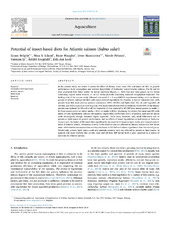| dc.contributor.author | Belghit, Ikram | |
| dc.contributor.author | Liland, Nina Sylvia | |
| dc.contributor.author | Waagbø, Rune | |
| dc.contributor.author | Biancarosa, Irene | |
| dc.contributor.author | Pelusio, Nicole | |
| dc.contributor.author | Li, Yanxian | |
| dc.contributor.author | Krogdahl, Åshild | |
| dc.contributor.author | Lock, Erik-Jan | |
| dc.date.accessioned | 2019-04-16T09:20:39Z | |
| dc.date.available | 2019-04-16T09:20:39Z | |
| dc.date.issued | 2018-04 | |
| dc.Published | Belghit I, Liland NS, Waagbø R, Biancarosa I, Pelusio, Li Y, Krogdahl Å, Lock E. Potential of insect-based diets for Atlantic salmon (Salmo salar). Aquaculture. 2018;491:72-81 | eng |
| dc.identifier.issn | 1873-5622 | en_US |
| dc.identifier.issn | 0044-8486 | en_US |
| dc.identifier.uri | https://hdl.handle.net/1956/19351 | |
| dc.description.abstract | In the present study, we aimed to assess the effect of dietary insect meal (IM) and insect oil (IO) on growth performance, body composition and nutrient digestibility of freshwater reared Atlantic salmon. The IM and IO were produced from black soldier fly larvae (Hermetia illucens, L.; BSF) that had been grown on (1) media containing organic waste streams, or on (2) media partially containing seaweed (Ascophyllum nodosum). The feeding trial of the current study followed a factorial 2 × 3 way-ANOVA experimental design with six dietary groups of Atlantic salmon fed diets with insect-derived ingredients for 8 weeks. A typical industrial diet, with protein from fish meal and soy protein concentrate (SPC) (50:50) and lipids from fish oil and vegetable oil (33:66), was fed to a positive control group. Five experimental diets were formulated, where 85% of the dietary protein was replaced by IM and/or all the vegetable oil was replaced by IO (IM from insects grown on media 1, IO from insects grown on either media 1 (IO1) or media 2 (IO2)). Replacing the dietary fish meal and SPC with insect protein significantly reduced the apparent digestibility coefficients (ADC) of protein, lipid and all amino acids investigated, though remained highly digestible. There were, however, only small differences due to protein or lipid source in growth performance, and no effects of insect ingredients on feed intake or feed conversion ratio. Inclusion of IM-based diets significantly increased both hepatosomatic index and visceral somatic index of Atlantic salmon. Proteinase activity in the intestine was not affected by dietary inclusion of BSF larvae meal, while leucine aminopeptidase activity was lower in fish fed with insect ingredients than the control group. Whole-body protein, lipid, amino acids and minerals contents were not affected by protein or lipid source. In general, this study showed that protein meal and oil from BSF larvae hold a great potential as a source of nutrients for Atlantic salmon. | en_US |
| dc.language.iso | eng | eng |
| dc.publisher | Elsevier | en_US |
| dc.rights | Attribution CC BY-NC-ND | eng |
| dc.rights.uri | http://creativecommons.org/licenses/by-nc-nd/4.0/ | eng |
| dc.subject | Alternative feed ingredients | eng |
| dc.subject | Atlantic salmon | eng |
| dc.subject | Insect meal | eng |
| dc.subject | Insect oil | eng |
| dc.subject | Seaweeds | eng |
| dc.title | Potential of insect-based diets for Atlantic salmon (Salmo salar) | en_US |
| dc.type | Peer reviewed | |
| dc.type | Journal article | |
| dc.date.updated | 2018-09-28T11:14:10Z | |
| dc.description.version | publishedVersion | en_US |
| dc.rights.holder | Copyright 2018 The Authors | en_US |
| dc.identifier.doi | https://doi.org/10.1016/j.aquaculture.2018.03.016 | |
| dc.identifier.cristin | 1607367 | |
| dc.source.journal | Aquaculture | |
| dc.relation.project | Norges forskningsråd: 238997 | |
| dc.relation.project | Norges forskningsråd: 220634 | |
| dc.identifier.citation | Aquaculture. 2018, 491, 72-81. | |

